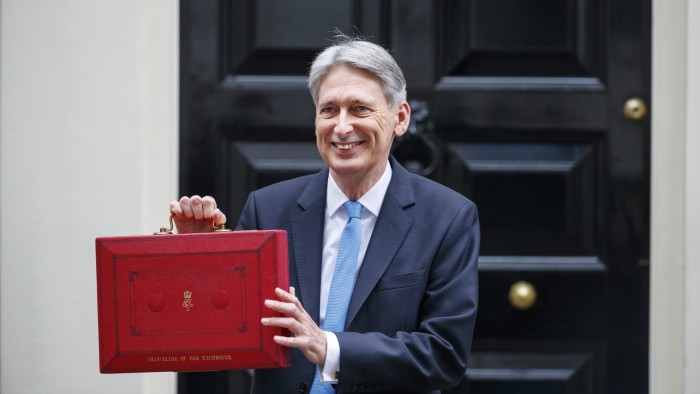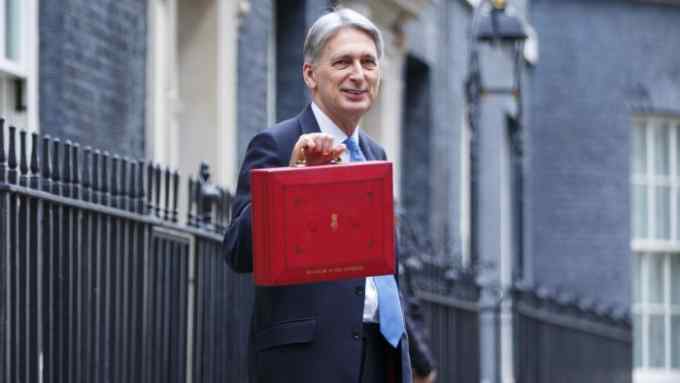Budget 2017: What does it mean for your money?

Roula Khalaf, Editor of the FT, selects her favourite stories in this weekly newsletter.
In his first Autumn Budget, Philip Hammond delivered a speech clearly designed to woo younger voters, with a finale of tax breaks for first-time buyers, but he also left wealthy voters relatively unscathed.
Here is our summary of how the key measures will affect your personal finances:
Housing and stamp duty
Stamp duty will be abolished for first-time buyers purchasing properties valued at up to £300,000, or on the first £300,000 of a property priced up to £500,000. Buyers will pay the normal rates of stamp duty on any amount above £500,000. Experts said this measure would save £1,660 on the average first-time buyer property.
The chancellor said 95 per cent of first-time buyers who pay stamp duty will benefit and added that 80 per cent of people buying their first home will pay no stamp duty.
“Abolishing stamp duty for first-time buyers on properties up to £300,000 is a strong move towards stimulating the property market. However, as recognised by the chancellor, this won’t help first-time buyers in London, so removing it from the first £300,000 of a £500,000 purchase will be a huge help,” said Chris Lloyd, associate director at Enness.
“For example, previously a first-time buyer would have paid £15,000, whereas now they will only pay £10,000. This will mean first-time buyers are left needing to find a lot less on top of the deposit for them to get on to the ladder.”
However, the chancellor’s speech included bad news for second homeowners with news that local authorities would now have the power to charge a 100 per cent council tax premium on empty properties.
Personal tax
The personal income tax allowance will rise from £11,500 to £11,850 in April 2018, while the threshold at which the higher rate of tax of 40 per cent applies will rise from £45,000 to £46,350. The changes will save the average basic rate taxpayer £1.35 a week.
The chancellor also announced that the marriage allowance is to be extended to widows and widowers. The marriage tax allowance allows a spouse or civil partner to transfer a tenth of their personal allowance to their income tax-paying partner.
Currently, the legislation does not allow transfers of personal allowance on behalf of deceased spouses and civil partners, or from a surviving partner to a deceased partner. But the government will now allow claims in cases where a partner has died before the claim was made. Claims can be backdated up to four years
Investments
The chancellor doubled the investment limit in the Enterprise Investment Scheme (EIS) for knowledge-intensive companies, but said he would ensure that the tax-efficient schemes were not used “as a shelter for low-risk capital preservation schemes”.
Investors can currently put up to £1m into EIS qualifying investments per year and receive tax relief upfront, that limit now increases to £2m. Businesses receiving the investment could also see their potential annual income double through the scheme, which the government said will unlock more than £7bn in growth investment.
The move comes as part of the government’s patient capital review, which is designed to support innovative UK businesses and clamp down on investors using the vehicles to invest in lower-risk, rather than high-risk innovative companies. The chancellor said a new test would also be introduced to reduce investment directed towards lower-risk investments.
Graham Neale, partner at Killik & Co, said: “We expected an announcement on lowering or eliminating the limits on lower-risk, asset-backed EISs. However, the government has been quite clever in that it is redirecting where investment should go by raising the limits on high-risk EIS.”
Pensions
Pensions tax relief remained unchanged. The Budget also confirmed the lifetime allowance for pensions is to increase to £1.03m from next April, in line with the consumer prices index.
“Following a series of reductions, this is good news for savers, even if on the surface the increase isn’t large,” said Kate Smith, head of pensions at Aegon. “A small increase is welcome for those nearing the limit, but this is a complex area and people seek financial advice to avoid paying unnecessary tax.”
Some had also predicted that there could be changes to the current salary sacrifice system but this too remains unchanged, and the basic state pension will increase by the triple lock.
“The state pension will increase by 3 per cent next April from £159.55 to at least £164.37, giving pensioners an annual rise of £250,” said Ms Smith. “However, those who reached state pension age before April 6 2015 and are on the old basic state pension will only see their state pension increase from £122.30 to £125.97 a week, giving an annual increase of only £191.”
Travel
The chancellor has announced a new railcard for those aged 26-30, giving 4.5m more young people a third off their rail fares.
Meanwhile, short-haul air passenger duty rates and long-haul economy rates to be frozen, paid for by an increase on premium-class tickets and on private jets.
Tax avoidance
Mr Hammond unveiled a package of measures to clamp down on avoidance and evasion expected to raise £4.8bn by 2022-23.
The Budget increased the time limits for HMRC assessments of offshore tax non-compliance, as much as tripling the current time limits to at least 12 years in all cases,
It also unveiled further measures to tackle online VAT fraud. In addition, it announced more resources to strengthen the tax authority’s ability to tackle tax avoidance in the future, totalling more than £2bn by 2023.
Welfare
The chancellor announced a £1.5bn package to “address concerns” about the delivery of universal credit and said the seven-day initial waiting period for processing of claims would be scrapped. Claimants to get one month’s payment within five days of applying.
Motoring
From April 2018, vehicle excise duty on polluting diesel cars will go up by one “band” of duty, although vans will not be affected. Charging electric vehicles at work will not count as a “benefit in kind” for tax purposes.
“We will cancel the fuel duty rise for petrol and diesel cars scheduled for April. Since 2010 we have saved the average car driver £850 and van driver £2,100,” Mr Hammond said.
However, James Hender, partner and head of the private wealth group at Saffery Champness, said the announcement of tax-free charging of electric cars at work is a “headline grabber, but in reality is something of a gimmick”. He added that the amount of administration that companies would have been forced to comply with if the use of the electricity by vehicles was taxable is potentially enormous.”
Experts’ views
Raj Mody, partner and global head of pensions, PwC
Of the “p” words to feature today, it was inevitable that “productivity” would be mentioned more than “pensions”. Despite the desire for stability, the relative silence on pensions is not good.
Our pensions tax system is ripe for reform and simplification. At every recent Budget, there has been speculation on what might change, and people react. Some crystallise their pensions early to get their 25 per cent lump sum, fearing its tax-free status could be lost. Others save more — or less — for short-term arbitrage. Trust and confidence in the pensions system as a whole does not improve.
Any change would be technically difficult and controversial. If pensions tax relief had a Facebook page, its relationship status would be “it’s complicated”. But it is a shame that this Budget takes us no further forward.
The chancellor announced in 2016 that there was “no consensus” for a new approach. In my view, there will never be consensus — but change is necessary. With nearly £40bn a year of tax revenues at stake, I expect this topic to come back another day.
Nimesh Shah, partner, Blick Rothenberg
In a move to support British tech businesses, the Budget announced reforms to rules governing Enterprise Investment Schemes and Venture Capital Trusts to encourage more private investment in high-growth innovative firms.
From April 6 2018, an individual investor could enjoy up to £600,000 of tax relief a year through the doubling of the current limits. While this is a welcome measure, the chancellor could have done more by increasing the associated tax relief to 45 per cent (from the current level of 30 per cent).
The amount of available cash in the private sector is higher than ever, especially following recent restrictions to the amount a person can contribute to their pension, and introducing a higher associated tax relief could have resulted in even more investment.
On the flip side, to protect founders of businesses taking on additional investment in their companies, the government will consult on a proposal to allow business owners to continue to qualify for the 10 per cent entrepreneurs’ relief rate, even where their shareholdings fall below the 5 per cent threshold because of dilution through external investment. Another welcome proposal to support Britain’s entrepreneurs.
Christine Ross, head of advice, Handelsbanken Wealth Management
This Budget will be remembered for what it did not include. There was no increase to the annual Isa allowance which remains at £20,000, although the Junior Isa limit will increase to £4,260.
None of the anticipated pension changes materialised, to the relief of some. The abolition of stamp duty for first-time buyers on properties up to £300,000 is welcome, but housebuyers will need to be clear on the definition of first-time buyer. Couples where one partner has previously owned a home will not qualify.
Tucked away among the many Budget publications is a research piece relating to inheritance tax and how the present tax reliefs influence the succession planning decisions of those owning business or agricultural assets. Currently, privately owned trading businesses and farming assets benefit from inheritance tax relief. The research concludes that many are unaware that these tax exemptions exist. I wonder if this might provide an idea of what is being considered for the future.
Lindsay Cook, FT Money Mentor columnist
No one expected fireworks but this Budget was the dampest of damp squibs. The chancellor had been expected to target any giveaways towards millennials and students, but there was very little — other than a railcard, and confirmation that the earnings threshold for repaying student loans will revert to the £25,000 level intended when tuition fees were tripled in 2012.
Increasing the stamp duty threshold to £300,000 for first-time buyers will help those in London and the Southeast, but not the regions where properties are more likely to be priced under the existing limit of £125,000.
The Rent-a-room scheme has benefited young renters by encouraging homeowners to rent out spare rooms with a £7,500 annual tax break. The Budget document says this is to be reviewed, which I fear could be the first step towards making it more complicated, less tax efficient and therefore less worth providing.
And at the other end of the age scale there was nothing to help the elderly who fear going into a care home and how they will pay for it.
But there was small comfort for all basic-rate taxpayers, who will able to keep an extra £1.35 a week from their earnings when the personal allowance increases next April. Don’t spend it all at once.
Reporting by Lucy Warwick-Ching, Kate Beioley, Vanessa Houlder and James Pickford
This article has been amended since original publication to clarify the pensions lifetime allowance figure

Comments